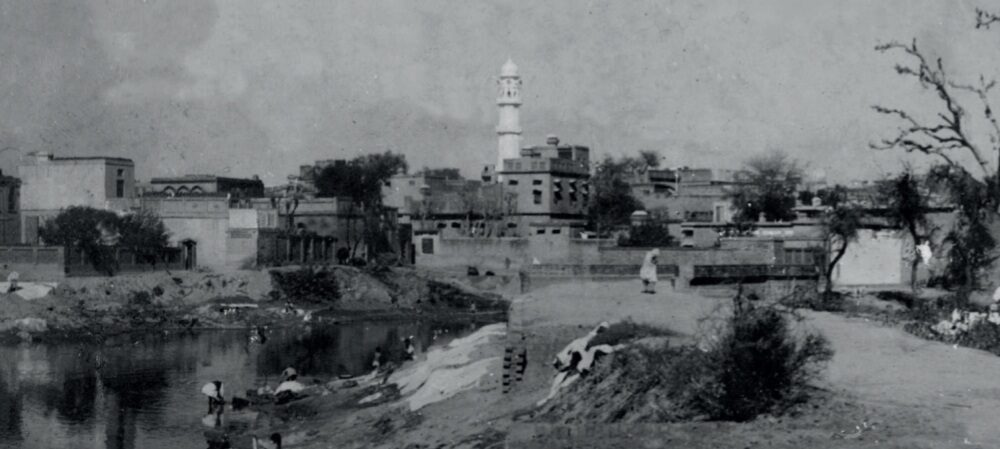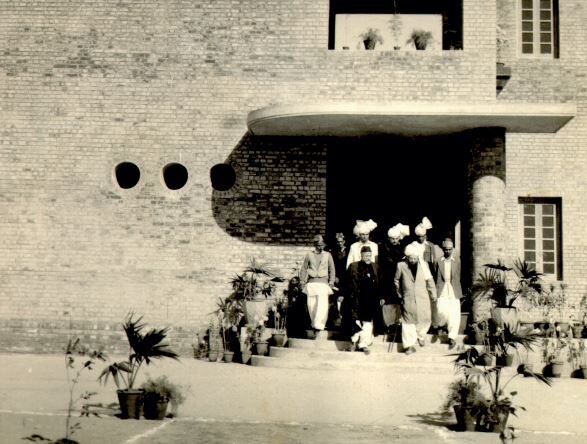Al Fazl, 1 December 1921

10 November 1921
Number of Bahá’ís
Hazrat Khalifatul Masih[ra] said:
“It has been announced about the Bahá’ís that their total number is 30,000. An American doctor and his wife both left their property and came to Haifa from America; their purpose of moving there was to stay with Abbas Affandi and present all their money to him. The said doctor’s wife states, ‘The number of Bábis or Bahá’ís is 30,000.”
The effect of worldly and spiritual rain
Thereafter, talking about the false claimants of prophethood, Huzoor[ra] said:
“This is also a proof of the truthfulness [of prophets] that the analogy of divine inspiration and revelation is given by water in the Holy Quran. This is a very logical example. We observe that when it rains, the earth produces all kinds of things, and where there are high-quality plants, some very low-quality stenchful things are also produced. Moreover, just as water has this quality that it takes the form of a container, so does spiritual rain pour down according to the capacity. As the earth spews out impurities from worldly rain, the same should happen after spiritual rain. We observe that when the Promised Messiahas claimed [to be the Messiah], some evil-natured people around him expressed their foulness. Their pretences show that the revelations showered upon the Promised Messiahas were true.
“However, history does not tell us about Báb, etc., that the said situation also happened there. If the rain of heavenly revelation poured down at that time, then the emergence of evil natures was also necessary, as it happens in the case of worldly rain.
“When the Holy Prophetsa presented his claim, such [evil-natured] people stood up [against him]. The emergence of such people is also a distinction between true and false claimants [of prophethood].”
11 November 1921
Bai‘at
1. Munshi Fateh Muhammad Sahib (former tehsildar), Mastung, Balochistan (now pensioner)
2. Mian Shah Mohammad Sahib (clerk), Kalat Agency, Mastung,
3. And Mian Ahmad Ali Sahib, Phero Chechi, Gurdaspur, took bai‘at.
Importance of Jumuah prayers
After the bai‘at, Huzoor[ra] turned to [Munshi Fateh Muhammad Sahib] tehsildar and said, “Are there any Ahmadis in your neighbourhood?” Tehsildar Sahib submitted that there were [some] in Bahawalpur.
Hazrat Khalifatul Masih[ra] said:
“I have asked about this because where there are Ahmadis, you should offer Jumuah prayers with them, until, by the grace of God, a jamaat is established in your village. This is because Jumuah is one of the most important obligations, and meanwhile, keep praying that God Almighty establishes a jamaat there [where you live].”

Reason behind opposition of a true religion
Tehsildar Sahib said, “The opponents there are not as bad as they are over here.”
Huzoor[ra] said:
“As long as something is far away, there is no feeling of fear or love for it. If there is a mention of a lion here, no one will be afraid, but if a lion actually comes in the gathering, there will be complete chaos. When they hear from you about Ahmadiyyat, the noble-natured among them will accept it and others will get angry. The true religion always makes people furious because they think that in its presence, their religion is at stake. The anger of the people here is justified because they have their own worries.”
A newly converted father’s apology to his Ahmadi son
Huzoor[ra] asked Munshi Noor Muhammad Sahib, son of Tehsildar Sahib, whether he had taken bai‘at in Quetta. Munshi Sahib answered that he had indeed taken bai‘at in Quetta in 1906.
Tehsildar Sahib said, “He [Tehsildar Sahib’s son, Munshi Sahib] did not even have a beard when he performed bai‘at. At that time, despite the opposition of other people and my harshness, he did not back down at all. I think there will be very few who will endure such hardships.” He further said, “I am fortunate and blessed that I have joined this Jamaat today and I apologise to my son for the pain that I inflicted on him when he took bai‘at.”
12 November 1921
Jumuah and government schools
A student of Amritsar Medical School asked, “Even on Fridays, lectures are held in the school at the time of Jumuah and we cannot join in the prayers, so what can we do about it?”
Hazrat Khalifatul Masih[ra] said:
“All Ahmadis should jointly request that they be allowed to offer Jumuah prayers on Fridays and the lecture should be scheduled accordingly. If they do not accept [your request], let me know. I will try.”
Every Ahmadi should be a missionary
Huzoor[ra] asked Babu Abdul Hakim Sahib (station master), Risalpur, about preaching. Babu Sahib said, “I keep on preaching. A doctor had also taken bai‘at. The debates, etc. are also held, but no missionary has ever come here.”
Huzoor[ra] said, “What are you? [Are you not a missionary?]”
Babu Sahib submitted, “I only spend that time in preaching which is spared after work.”
Hazrat Khalifatul Masih[ra] said:
“This is how preaching takes place. Every Ahmadi is a missionary. As much time as you have, it is your duty to preach in it.”
Reflection of one’s own state in dreams
On the mention of ghair mubai‘een [those who refused to perform bai‘at of the Second Khalifa], Babu Sahib submitted [to Huzoorra]:
“Once, Maulvi Ghulam Hassan Sahib Peshawari told me that he had seen a dreadful dream about Mian Sahib [Hazrat Khalifatul Masih IIra]. When I asked him about it, he said, ‘I saw that I was sitting on a chair in a court and Mian Sahib was presented before me as an accused person. I said to him that since he was the son of the Promised Messiahas, I had mercy on him.’
“After some time, it so happened that Maulvi Sahib himself, as an accused person, had to appear in a government court due to a religious dispute and the same situation happened to him. When I reminded him of his dream, he fell silent.”
(Translated by Al Hakam from the original Urdu in the 1 December 1921 issue of Al Fazl)

